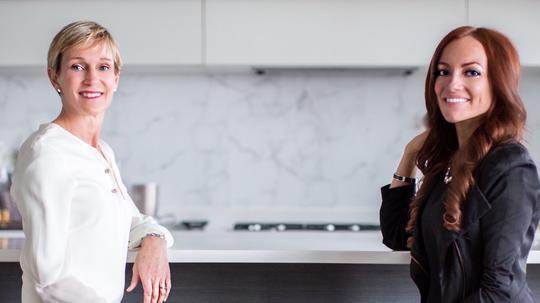
In 2016, women-founded startups got just 2.19 percent of venture capital funding.
But that's not the case for venture capitalists Cayla Weisberg and Gerri Kahnweiler's portfolio: 100 percent of their funding went to female-founded startups.
That's because they're the investors behind new firm InvestHer Ventures, the first VC firm in Chicago (and one of just a handful in the Midwest) that only invests in startups with at least one female founder. Since launching last spring, they've made eight investments and they're gearing up to make six to eight more deals within the next year.
While InvestHer Ventures started out as a way to directly address the funding gender gap, the two investors have a less confrontational approach to investment discussions (fewer pitches peppered with questions, more conversations), and take a hands-on approach to helping portfolio companies get to the next round of funding through sales and business development coaching. The idea is to not only fund female founders, but make sure they're on the track to startup success beyond the early stage.
We don't do pitches, we have conversations
"We recognize that traction is a big piece that our companies want help with, and funds want to see," said Weisberg. "Being able to provide those tools is helping those companies scale, which we realize is critical to the success of future rounds."
Weisberg and Kahnweiler first met at a wedding shower Kahnweiler was hosting for a mutual friend. They happened to sit next to each other, and got talking about startups and their shared frustration with the consistent lack of support for female-founded ventures.
"It was like two worlds definitely collided," said Weisberg. "We both had the same mission, but it came from two totally different professional backgrounds."
Weisberg had experience in startups, working in business development with Lightbank portfolio companies, while Kahnweiler had worked in philanthropy for 15 years with the Jewish Women's Foundation of Metropolitan Chicago. The duo considered launching an accelerator or angel investor network, but with organizations such as Women Tech Founders and 1871's WiSTEM picking up speed, they decided the real need was getting capital to female founders on the rise.
While it's the first foray into venture capital for both investors, it hasn't slowed them down. They had over 200 conversations with founders in their first year, and invested in eight companies including Chicago startups KnowledgeHound, Pak'd, PartySlate, ZipFit Denim and Codeverse. While they declined to share the amount of their fund, they're focused on seed stage funding (as well as add-on rounds, as several of the startups they invested in are looking to raise a Series A in 2018, said Kahnweiler) and invest between $50,000 and $250,000 per deal.
They are typically looking for tech-enabled, data-driven solutions, Weisberg said, but they're not focused one geography or industry. Rather they're looking for "the right founder, the right idea to solve the right problem," particularly in stodgy industries that don't typically have female founders, such as fintech and insurtech. She pointed to market research startup KnowledgeHound and agtech analytics startup Agrilyst, as examples of founders tackling big issues in these hard-to-disrupt industries.
To find these right founders, they did away with quick meetings and rapid fire questions. "We don't do pitches, we have conversations," Kahnweiler said at a recent Women Tech Founders event.
They carve out two hours to talk with a founder, she explained, and provide feedback on their startup. "Regardless of what we decide to do, we often will point out areas [where] they need more work, more traction, as opposed to, 'thank you very much, you can go home now,'" Kahnweiler added.
Capital is just one part of the startup success equation, however. Kahnweiler noted that most of the women they're talking to are first time founders, still building their network and learning how to scale their business. But instead of passing on founders just because they're not yet serial entrepreneurs, they roll up their sleeves and provide business development training to make sure startups get to the next level of traction: Weisberg has developed a three-pronged sales development approach that's focused on creating monthly and annual recurring revenue. They're also partnering with WiSTEM to provide sales and business development training for their accelerator startups.
And because women are still underrepresented as employees in startups and across the tech industry, Weisberg and Kahnweiler work with founders to build diversity into their team from the ground up.
"When we walk in to meet a team and I see there’s the one woman and the rest of her team is men, for example, we talk about that," said Kahnweiler. "[We] say, 'when as you’re thinking about your next hiring, how can we make sure that there’s more women on the team?' We really are talking that talk from top to bottom."








